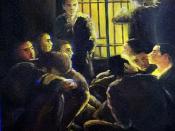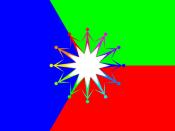Reflection Paper
Manjieva Edita
To what extent, how and why, Plato and Aristotle's conception of democracy differ from the modern conception of democracy.
Many of our ideas about democracy originated with the ancient Greeks. The Greeks roots of the world democracy are demos, meaning the "people" or, to put it in Aristotle's way, self-government by the many, as opposed to the few or the one. This is similar to Lincoln's definition: "government of the people, by the people, and for the people." For the Greeks it was a bad thing, and nowadays it's a great thing. It happened because those time "people" or "many" were poor, uneducated, undeveloped to think about involvement in any kind having governing. But beginning with the renaissance period, more and more people from lower classes became able to require good education and therefore they started their involvement in politics. I think, Industrial revolution in Britain, when new technologies were invented, and middle class appear, had a great impact on process of transformation of democracy from bad thing to good thing.
Plato, Aristotle, and most western philosophers and rulers before the eighteen-century were not friendly to the idea of rule by the many. Plato believed that governing was a difficult art, requiring the greatest sophistication, intelligence character, and training, certainly not the province of ordinary people. Plato preferred rule by the select few or by an enlightened one- " Knowledge of truth and error -of right and wrong-is certain because it ultimately derives from a mystic vision of god. But only a few are capable of attaining, after a long preparatory education, such absolute certainty; these are to rule as philosopher kings."
The idea that ordinary people might rule themselves, opposed to Plato, represents an important element of liberal democracy. As the American philosopher John...


